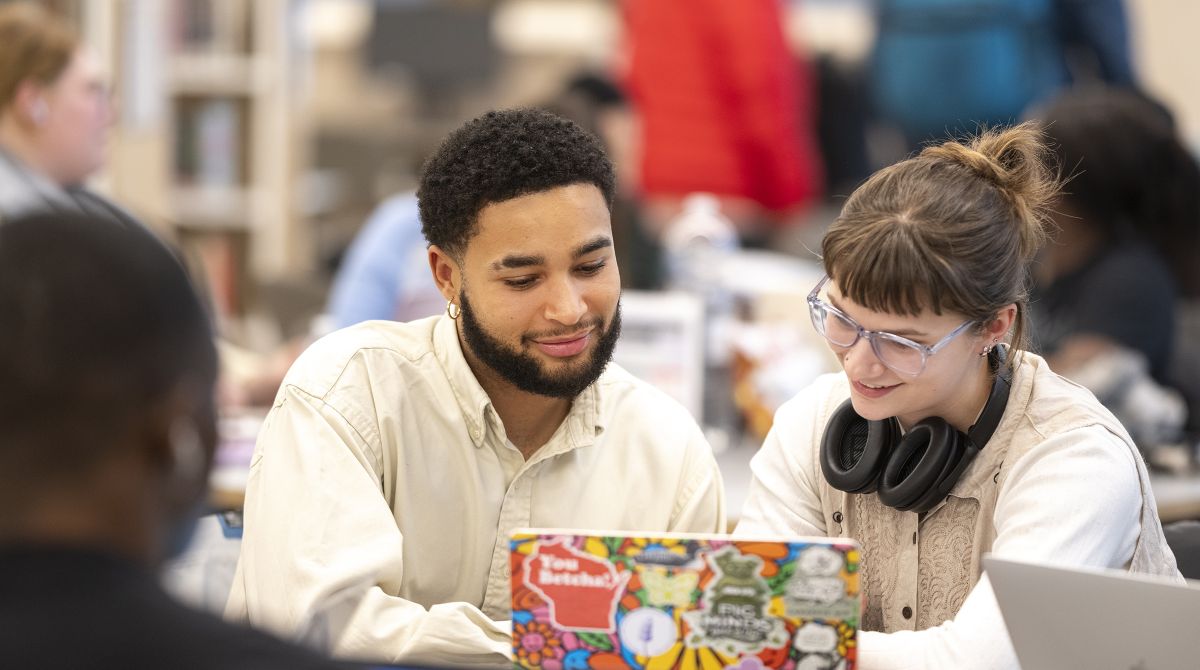Next phase of Kingston University's sector-leading Future Skills programme preparing students for career success set for autumn launch
Posted Wednesday 17 April 2024

A significant milestone has been reached in the roll out of Future Skills across Kingston University with the development of Explore modules for all second year courses.
Explore is the second phase of the Future Skills programme, following on from the introduction of Navigate modules in all first-year undergraduate courses this academic year. From this autumn, more than 70 per cent of undergraduate students will be studying Future Skills as a core part of their degree.
The roll out of Future Skills across the undergraduate curriculum is a central part of the University's transformative Town House Strategy, delivering a progressive new model of education that ensures students develop the skills, experience and opportunities to thrive in their careers.
Reaching the stage where a majority of the University's undergraduate cohort were engaged with Future Skills represented a real milestone, Professor John Craig, Pro Vice-Chancellor for Education, said. "Through the Future Skills programme we are transforming the way we teach to ensure our graduates are prepared to meet the rapidly changing needs of industry. Doing so at this pace and scale is a huge achievement. It's been fantastic to work with course teams across the University who've demonstrated such enthusiasm and creativity in developing the Explore module for their students."
The Future Skills programme is informed by research carried out since 2021 through the University's award-winning Future Skills campaign to identify the skills most valued by employers. It is designed to equip students with nine Future Skills Graduate Attributes based on the campaign's research findings, including creative problem solving, digital competency, being enterprising, having a questioning mindset, adaptability, empathy, collaboration, resilience and self-awareness.
What students will gain through Explore
The Explore module includes workshops that build on the learnings from Navigate alongside engagement with an assessment centre that provides a realistic simulation of the graduate recruitment process.
Students will also take part in a Future Skills experience, providing industry-relevant learning that explicitly develops their Future Skills Graduate Attributes. This could be through live-brief projects with industry involvement, hackathons, or micro-placements.
Creating further opportunities for students to engage with employers as part of their course was a key part of the Future Skills programme, the University's Director of Student Development and Graduate Success Ali Orr said. "In Navigate, students were introduced to Future Skills through self-diagnostic and personal development sessions. Through the Explore module, they can take those learnings into working on solutions to problems posed by businesses and in interview and assessment scenarios, recognised through academic credit."
The module is designed to equip students with the ability to critically evaluate their personal development through reflection on progress and goals, as well as being able to demonstrate the use of the graduate attributes to explore problems beyond their discipline.
As with Navigate, Explore content will be embedded in a core module, comprising around 12.5 per cent of a student's total learning hours, covering scheduled activities such as the workshops, assessment centre and Future Skills experience, alongside guided independent study.
Experiences of students and academics taking part in the Explore pilot
As part of the preparation for the full roll out of Explore, pilots have been taking place across several courses with second-year students who were also involved in Navigate pilots in their first year.
 Computer science student Abdurrahman Alsharef said his Explore module had brought to life how Future Skills could be applied in a business setting.Among those were computer science student Abdurrahman Alsharef, who explained how the Explore module had contextualised the Future Skills introduced through Navigate – bringing to life how they would be used in a business setting.
Computer science student Abdurrahman Alsharef said his Explore module had brought to life how Future Skills could be applied in a business setting.Among those were computer science student Abdurrahman Alsharef, who explained how the Explore module had contextualised the Future Skills introduced through Navigate – bringing to life how they would be used in a business setting.
"In my course I had to come up with a start-up idea, flesh out the technical, legal and financial details about how it would be founded and how it then acquires funding," he said. "Taking part in tasks where you have to debate ideas and distil down to something that works for everyone is an experience I think all students will benefit from. I've found a direct correlation between what I've learned through Future Skills and my own real estate photography business."
The second year of Future Skills was where students were starting to really test themselves, Dr Samar Gad, BSc Accounting and Finance course director, said. In her course's Future Skills Experience, students stepped into the role of management accountants through a business game set within the gaming industry. It involved analysing costs across a range of issues and considering the impacts on profitability and employee performance.
"It's so important for students to learn how to apply their skills within different settings and industries, developing their creative problem solving," she said. "It's been great to hear how they have been benefiting from Explore – one student wrote to me after she was offered a placement to say how valuable the assessment centre had been."
The current academic year has seen Navigate modules rolled out for all first-year undergraduates as an integral part of their courses, with this cohort being the first full year group to progress on to Explore modules next year, and then Apply in the third year of their degree.
- Find out more about the University's Town House Strategy and its Future Skills campaign.
Contact us
General enquiries:
Journalists only:
- Communications team
Tel: +44 (0)20 8417 3034
Email us



